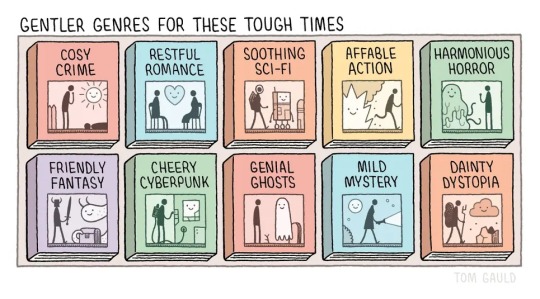#genre
Text
What's that bro? You began interacting with a media from a different country than yours and/or was made in time period different than the recent present day? Haha that's sick bro! Keep expanding your horizons bro! You're remembering to take into account that sociocultural norms, gender roles and genre expectations are different from what you are used to and meeting the story halfway, instead of forcibly superimposing your ideals into the story, right bro? Right? Right?
47K notes
·
View notes
Text
youtube
EDITED TO ADD: St. Louis University posted the 2023 St. Louis Literary Award ceremony; Neil’s talk starts about 40 minutes in. (Thanks DanGuyF)

In an interview before the event [Neil] Gaiman said that when he started writing comics, he “wasn’t even in the gutter.”
He said: “I used to look up and admire the people in the gutter. The science-fiction people were in the gutter, the children’s literature people were in the gutter, too, and I was so far down, I was in the storm drain.”
Great writeup by Jane Henderson from the St. Louis Post-Dispatch sharing highlights of Neil’s talk at the St. Louis Literary Award!
#neil gaiman#comics#st louis#st louis literary award#it does look like a fountain pen#writing#genre#quotes#book talk#fantasy#with love from florida#Youtube
2K notes
·
View notes
Text
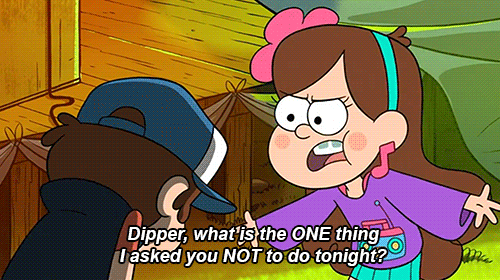
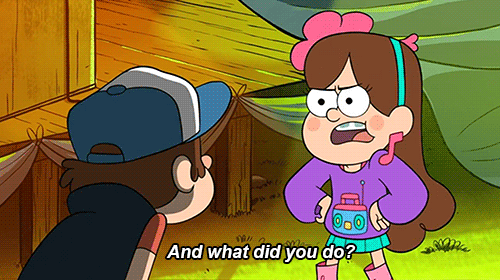
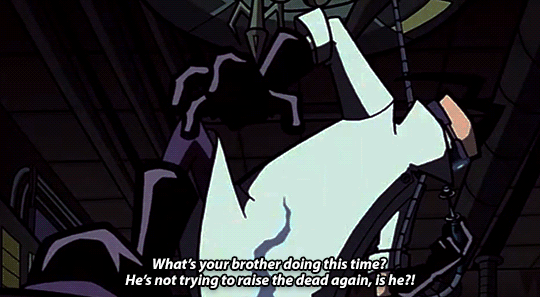
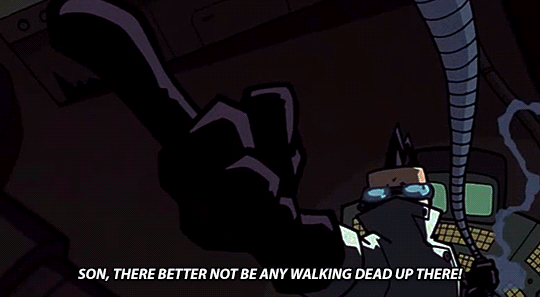


#genre#Gravity Falls#Invader ZIM#The Simpsons#animation#television#remember when thepencilzfiles made a crossover of all three of these and just never continued it? Unforgivable#gf gifs are from nyabbycat and iz gifs are from gifsofziiim
1K notes
·
View notes
Text
boyfriend!harry headcanons

-> Every day starts with Harry's sleepy face pressed into your neck, his breath tickling your ear as he mutters "good mornin', lovie." He steals kisses between yawns, his warm hand tracing patterns on your back until you're both giggling, tangled in the sheets.
-> He knows your perfect cup of coffee, the one that makes you smile like sunshine. He surprises you with it in bed, accompanied by a plate of fluffy pancakes or French toast, shaped into hearts, of course.
-> He pretends to scoff when you put on a chick flick, but you catch him stealing glances at the screen, his lips twitching with a suppressed smile. He hums along to the cheesy soundtrack, his voice husky and low, sending shivers down your spine.
-> One minute you're planning grocery shopping, the next he's whisking you away to a hidden beach for a sunset picnic, complete with a spontaneous bonfire and stargazing. He lives for creating memories that make your heart skip a beat.
-> He believes in you more than you believe in yourself. He cheers you on at work, celebrates your victories (big or small), and holds you tight when you doubt yourself. He whispers encouragement in your ear, his voice laced with unwavering faith.
-> He leaves little love notes tucked in your purse, on the fridge, even in the pages of your favorite book. He hides tiny trinkets for you to find – a seashell from your first beach trip, a vintage postcard with a romantic quote, a single, perfect rose.
-> He pulls out your chair at restaurants, opens doors, and insists on carrying your groceries. He walks on the outside of the sidewalk to shield you from the rain, and offers his jacket when you're cold. It's the little things that make your heart melt.
-> His hands wander under your shirt, sending goosebumps erupting on your skin. He whispers sweet nothings in your ear, promises of forever and endless love. He makes you feel like the only person in the world, cherished and adored.
-> He strums your favorite song on his guitar, his voice husky and soulful, just for you. He pulls you close, swaying to the rhythm, his gaze never leaving yours. He turns any room into a dance floor, his laughter echoing as you spin, lost in your own little world.
-> He's your rock, your confidant, your safe harbor. He listens without judgment, offers advice without pushing, and celebrates your individuality. He loves you for who you are, flaws and all, and that's the most beautiful love story of all.
♡~~~♡~~~♡~~~♡~~~♡~~~♡~~~♡~~~♡~~~♡~~~♡~~~♡
jealous!harry headcanons
let me know if you like this! you can tip me here!
please like and reblog, it may seem stupid but it actually helps a lot! ♡
♡~~~♡~~~♡~~~♡~~~♡~~~♡~~~♡~~~♡~~~♡~~~♡~~~♡
taglist:@freedomfireflies @gurugirl @thechaoticjoy @styleslover-1994 @gem1712 @ellaorchard @bxbyysstuff @opheliaofficial07 @rafaaoli @tchlamqtsgf @the-mouse27 @indierockgirrl @vrittivsanghavi @walkingintheheartbreaksatellite @drewrry @babyiamperfectforyou @me-undiscovered @tbsloneely @whoreonmondays @kathb59 @avalentina @kittenhere @speedywritingharrystylesjudge @mypolicemanharryyy @theendx888 @ladscarlett @daphnesutton
#headcanons#harry styles headcanons#my headcanons#tropes#harry#harry styles#harry styles fanfiction#harry styles smut#harry styles fanfic#harry styles fic#harry styles x reader#harry styles imagine#genre#writing stuff#harrystyles#harry edward styles#harry fluff#harry styles au#harry styles fan fiction#harry styles concept#harry styles fluff#harry styles imagines#harry styles masterlist#harry styles blurb#harry styles fic rec#harry prompts#harry headcanons#boyfriendrry#boyfriend!harry#harry styles boyfriend
408 notes
·
View notes
Text
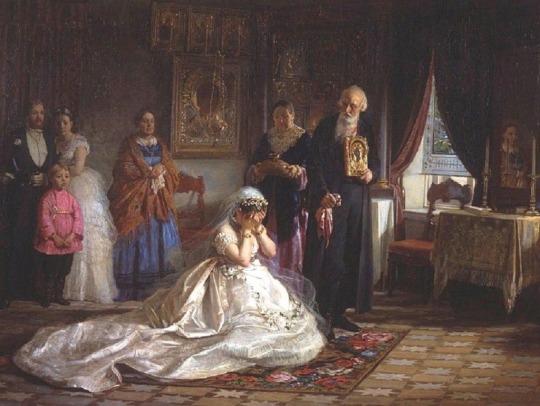
Before the Wedding, Firs Zhuravlyov. 1870s.
#aesthetic#art#art history#fashion#historical fashion#historical art#women in art#women#victorian#victorian aesthetic#1870s#1870s aesthetic#genre painting#Russian art#Russian history#imperial Russia#wedding#genre#wedding art#red#red aesthetic#1870s wedding#1870s dress#1870s gown
309 notes
·
View notes
Text
My two favorite types of anime are like:
An ancient evil has risen and the only ones who can stop it are these 3-5 mentally ill teens operating at different levels of queerness and insanity. (setting may vary)
and
Hercules, Cu Chulainn and Princess Kaguya come back to life and get an apartment together because rent is expensive these days.
#incorrect super smash bros#not a quote#anime#anime genre#manga#genre#idea#thoughts#thought#the devil is a part timer#Saint Young Men#Black Clover
536 notes
·
View notes
Text
Ok, I think I might be exiting the "are you fucking kidding me?" period and ready to make a real argument, so lets talk about Three Act Structure!
Is OFMD S2 just the "Darkest Hour"?
A very common explanation I've been seeing for some of the... controversial... aspects of S2 is that it's meant to be that way. That the middle act is where the protagonists hit their lowest point. Where we get the big failure point. Where everything looks kind of shit.
S2 is supposedly just that point. It's The Empire Strikes Back. People have been making that comparison since before the first episodes even dropped, telling everyone to expect something that could be disappointing or unsatisfying - it's just a matter of needing to wait for S3 to pull it all together.
It's not a baseless framework to consider the show through - I'm pretty sure David Jenkins has mentioned it in interviews (or at least mentioned he planned for three acts / seasons) so it's certainly worth asking how he's doing at the 2/3rd mark.
So - quick summary of Three Act Structure:
Act 1 introduces our characters and world. It includes the inciting incident of the story and the first plot point, where a) the protagonist loses the ability to return to their normal life, and b) the story raises whatever dramatic question will drive the entire plot. Act 2 is rising action and usually most of the story. The protagonist tries to fix things and fucks them up worse, in the process learning new skills and character developing to overcome their flaws. Act 3 is the protagonist taking one more shot, but this time they are ready. We get the climax of the story, the dramatic question gets an answer, and then the story closes.
If you want examples, the Star Wars Original Trilogy is a very popular template. And, hell, he said it was a pirate story... the main Pirates of the Caribbean trilogy also does a solid job with their three acts.
Let's compare. (Spoiler: I'm not impressed 🤨)
---
First thing I need to establish... Wait. Two things. First is that Three Act Structure is flexible, so we can't really analyze success or failure by pulling up a list of necessary plot beats that should have been hit in X order. Second is that if you tell me you are writing a romance with a Three Act Structure - where "the relationship is the story" - the first thing I'm going to do is ask you how you are adapting it. Because while there's not necessarily anything preventing you from applying this to a character driven plot, most people are familiar with it as plot structure for externally driven conflict.
Unless there's a reason the status of the main relationship is intrinsically tied up in the current status of the war against the evil empire, a standard Three Act Structure is going to entail either an antagonistic force that absolutely wants your main couple apart being the main relationship obstacle OR the romance aspect being a subplot to the protagonist's narrative adventure. None of those sound like how the show has been described.
So how is OFMD adapting it?
---
Act 1
(Can't figure out how well Act 2 is doing if we don't start at setup.)
Right out the gate, OFMD breaks one of the main "rules" for a story where the Acts are delivered in three parts. Namely the one where the first Act is treated as an acceptable standalone story, with it's own satisfying yet open ended conclusion.
In Star Wars, A New Hope ends with the princess rescued, Luke finding the Force, Han finding his loyalty, and the Death Star destroyed. The Empire isn't defeated, the antagonists still live... the story is not over, but this one movie doesn't feel unfinished.
Similarly, Curse of the Black Pearl gives Jack his ship back, Elizabeth and Will get together, and Norrington has the English Navy let them all off the hook and give Jack and the pirates one day's head start.
OFMD's final beat of S1 being Kraken Arc starting is not that, even if Stede returning to sea is still a pretty hopeful note. Now... I don't necessarily think this was a bad call. At least, not if the story is the relationship. It's easy to close on a happy ending and then fuck it up next movie if the conflict is external and coming for them. Not so much if you're driving the story with your protagonists' flaws, in part because it should be really obvious at the end of setup that your main characters need development and can't run off together right now. I actually like that they were risk-takers and let S1 look at the situation clearly vs doing a fragile happy end, because it takes into account the difference between a character-driven and plot-driven narrative.
I think OFMD's Act 1 actually ends at maybe the Act of Grace? Well, there through the kiss on the beach, counting as our "first plot point" before everything goes wrong, basically.
At that point, they have setup the story and characters. We've been introduced to Edward and Stede's current issues. Signing the Act of Grace does make the intertwined arcs between them real - it's no longer a situation that either one of them could just walk away from like it was in 1x07 - and we narrow in on the (alleged) driving question of the show:
It's not about "Will Stede become a great pirate?" or "Will we develop a better kind of piracy for the crew?" - the show is the relationship and the big question is "What is Stede and Edward's happy ending?"
Act 1 ends on their first solution, being together and making each other happy and admitting it's more than just friendship. Act 2 starts, appropriately, by saying both of them are currently too flawed for that to go anywhere but crashing and burning.
Now... looking back, what does Act 1 do well vs poorly?
I think it's really strong on giving us the foundation for BlackBonnet's characters and flaws. We aren't surprised Stede goes home or Edward goes Kraken (or at least... we weren't supposed to be surprised. There are still a lot of holdouts blaming Izzy for interrupting Edward's "healing" despite how at this point in the story it doesn't make sense for Edward to have the skills to heal... but I digress). The relationship question is compelling at the end of S1, the cliffhanger hooks, and the fandom explosion of fics did not come from nowhere - the audience was invested.
I also think Act 1 does a great job of settling us in the universe. We understand the rules it abides by, from how gay pirates are just a fact of life to how there's no important organs on the left side of the body. Stede has a muppety force field. Rowboats have homing devices, and port is always as close as you want it to be. Scurvy is a joke. The overblown violence of pirate life is mostly a joke, but we are going to take the violence of childhood trauma seriously.
Lucius's fake-out death, while technically part of Act 2, works well because Act 1 did a good job of priming everyone to go "obviously this show wouldn't kill a crew member for shock value, and we're 100% supposed to suspend disbelief about how he could have survived getting flung into the sea in the middle of the night." And we do. And we get rewarded for it.
Regarding antagonists - a big focus of any setup - the show is deliberately weak. The one with the most screentime is Izzy, and he's purposefully ineffective at separating our main couple. Every antagonist is keyed to a particular character, and they function mostly to inform us of that character's flaws and development requirements. The Badmintons tell us about Stede's repression and feelings of inadequacy, and Izzy tells us about Edward's directionless discontent and tendency to avoid his problems. Effectively - the show is taking the stance this will be a character driven narrative where Stede and Edward's flaws are the source of problems and development the solution. No person or empire (or social homophobia) is separating them...
...which leads me to something not present - there nothing really about the struggle of piracy against the Empire. Looking at Curse of the Black Pearl... we see piracy is in danger. The Black Pearl itself is described as the last great pirate threat the British Navy needs to conquer. Hangings are omnipresent - Jack is sentenced to die by one almost as soon as he's introduced to the story, when his only act so far had been to wander around and save Elizabeth from drowning. OFMD tries to invoke this kind of struggle in 2x08, but there's no foundation. Our Navy antagonists are Stede's childhood bullies, and so focused on Stede the crew isn't even in danger when they get caught. The Republic of Pirates is getting jokes about being gentrified, not besieged.
Even the capture of Blackbeard by the Navy is treated as a feather in Wellington's cap but not a huge symbolic blow against piracy... because we just do not have that grand struggle woven into Act 1. You only know the "Golden Age of Piracy" is ending if you google it, or have watched a bunch of pirate shows.
Overall, a solid Act 1, well adapted to the kind of story they've said they were looking to tell - a romance in the (silly-fied) age of piracy, instead of a pirate adventure with a romantic subplot.
---
Now, Sidebar - Where is the story going?
The thing about the dramatic question - in OFMD's case: "What is Stede and Edward's happy ending?" - is that a) there's normally more than one question bundled up in that one + sideplots, and b) while you aren't supposed to have the answer yet, you can usually guess what needs to happen to give you the answer.
Back to our examples... Luke's driving question is "Will the Empire be defeated?" Simple. Straightforward. Also: "Will Luke become a Jedi?" The eventual climax of our story from there is pretty obvious... the story is over when Luke wins the war for the Rebellion in a Jedi way. That's the goal that they are working toward.
Pirates of the Caribbean is a bit more complicated. We're juggling more characters and have a less defined heroic journey, but there are driving questions like "Is Jack Sparrow a good man?" and "Is Will Turner a pirate / what does that mean?" and even "Will the British Navy defeat piracy?" They get basic answers in Curse of the Black Pearl, and far more defined ones in At World's End. Still, this is another plot-driven narrative. They've laid the foundations for the Pirates vs Empire struggle, and when that final battle turns into the trilogy climax then you know what's happening.
OFMD is not doing a plot-driven narrative. To judge how they are doing at their goals, we have to ask what they think a happy ending entails in a character sense.
Clearly it's not the classic romantic sideplot, where the climax is the first kiss / acknowledgement of feelings. They've teased a wedding in Word of God comments a lot, so that's probably our better endpoint. Specifically, though, a wedding where both of our protagonists aren't ready to flee from the altar (big ask) and where they've both grown enough that their flaws / mutual tendencies to run away from life problems won't tank the relationship.
In Stede's case it's still massive feelings of inadequacy and being too repressed to talk about his problems. Also he ran away from his family to chase a lifelong dream of being a pirate - "Is Stede going to find fulfillment in being a pirate captain, or will the real answer be love?" Edward meanwhile expresses a desire to quit piracy and retire Blackbeard, but we also find out he's struggling with massive self-loathing and guilt from killing his father - "Is retiring what Edward wants to do, or is he just running away?"
If they are going to get to a satisfying wedding beat at the climax of their story, what character beats do we need to hit in advance?
Off the top of my head - both characters need to self-realize their flaws (a pretty necessary demand of anyone who runs away from problems). They are set up to balance each other well, but also to miscommunicate easily. They have to tell each other about or verbally acknowledge that self-realization so it can be resolved. Stede has to decide how much being a pirate means to him. Edward has to decide if he's retiring and what he wants to do. They both need to show something to do with getting past their childhood traumas given all the flashbacks. Through all this, they also need to hit the normal romance beats that convince the audience they are romantically attracted to each other and like... want to get married.
Oh, and this is more of a genre-specific sideplot, but once they demonstrate a behavior that hurts the people who work for them, they need to then demonstrate later how it won't happen again. Proof of growth, which is kind of important in a comedy where a lot of the humor is based in them being massively self-centered assholes. Stede doesn't earn his acceptance in the community until he kicks Calico Jack off the ship, making up for causing the situation with Nigel in the first episode. A workplace comedy can get a lot of material from the boss as the worker's antagonist, but if you want the bosses to stay sympathetic you have got to throw them some opportunities to earn it.
All that sounds like a lot, but like - the relationship is the story, right? If we spend so much time on establishing flaws big enough to drive a story, we also have to spend time on fixing them. Which is where the turning point hits.
---
Act 2: How it Starts
This is where the full story reality-checks your protagonist. Glad you saved your boyfriend and embraced new love in Act 1, but his repressed guilt means he's about to completely ghost you, and your own abandonment issues and self-loathing are about to make his dick move into everyone else's problem.
Again, it's a non-conventional choice OFMD has this start at the very end of S1 rather than with a sudden dark turn in the S2 premiere, but it's still pretty clearly that point in the Three Act Structure.
In Star Wars, The Empire Strikes Back opens with a timeskip to our Rebellion getting absolutely crushed and hiding on a miserable frozen planet. The Empire finds them as the plot is kicking off and they have to desperately flee. They get separated. Han and Leia try to go to an ally for help and end up in Vader's clutches. It's a sharp turn from the victorious note that A New Hope ended on.
Pirates of the Caribbean's Act 2 starts dark. Dead Man's Chest opens with our happy couple Will and Elizabeth getting arrested on their wedding day for the "happy end" escape of the last movie. Jack has not been having success since reclaiming his ship, and we'll soon find out he's being hunted by dark forces. As for the general state of piracy, we get a horrifying prison where pirates are being eaten alive by crows, and a new Lord Beckett making the dying state of piracy even more textual. "Jack Sparrow is a dying breed... The world is shrinking."
The key here is making a point that our heroes aren't ready. This is the struggles part - things they try? Fail. The odds do not look to be in their favor.
Now, OFMD apparently decided to go all-in on flaw exploration, especially with Edward. The first 3 episodes of S2 are brutally efficient in outlining Edward's backslide. In S1 you could see he had issues with guilt and feeling like a bad person. S2 devolves that into a destructive, suicidal spiral where Edward forces his crew into three months of consecutive raids, repeats his shocking act of cruelty with Izzy's toe offscreen (more than once!), escalates it with his leg, and finally they state directly that Edward hates himself for killing his dad so much that he fears he's fundamentally unlovable and better off dead.
Stede's struggles are subtler, but most definitely still there. He's deliberately turning a blind eye to tales of Edward's rampage, half from simply being too self-centered to care about the harms Edward causes others, and half from being unable to face or fathom that he had the ability to hurt Edward that much. Upon reunion he wants to put the whole thing behind them, not addressing why he left in the first place. Very "love magically fixes everything" of him, except Stede is no golden merman.
Interestingly, here, BlackBonnet's relationship dysfunction has very clearly been having a negative impact on the surrounding characters we care about. Make sense, since it's the driving force of the story, but that also adds a lot more relationships we need to make right. Like... Edward is the villain to his crew. The show focuses on their trauma and poisoned relationships with him. And then draws our attention even more to Stede taking his side to overrule their objections to him.
For a story where the conflict and required resolutions are primarily character based, and the setup had already given the main couple a good amount to work with, dedicating a lot of S2 to adding more ground to cover was... a choice. Potentially very compelling on the character end, certainly challenging on the writing end... but not a complete break with the structure.
Bold, but not damning.
---
Act 2: How it Ends
Now it is true that Act 2 tends to end on a loss. Luke is defeated by Vader and loses his hand, and Han has been sent away in carbonite. Jack Sparrow for all his efforts cannot escape his fate, and he and the Pearl are dragged to the locker.
But the loss is not the point. The loss is incidental to the point.
Act 2 is about struggles and failure, but it's also about lessons learned. There's a change that occurs, and our cast - defeated but not broken - enters the final act with the essential skills, motivation, knowledge, etc. that they lacked in the beginning.
Luke Skywalker could not have defeated the Empire in Return of the Jedi until he'd learned the truth about his father and resisted the Dark Side in The Empire Strikes Back. (Ok, confession, I'm using Star Wars as an example because literally everyone is doing so, but frankly it's a better example of formulaic Three Act Structure repeating within each movie because on a trilogy level - relevant to this comparison - it is a super basic hero's journey in a very recognized outfit and as such the Act 2 relevance is also... super basic "the hero tries to fight the antagonist too early" beat where he learns humility. Not really a lot going on. So, for the better example...)
Dead Man's Chest has a downer ending with the closing moment of the survivors regaining hope and a plan against an enemy now on the verge of total victory - a classic Act 2. But in that first loss against Davy Jones we get Will's personal motivation and oath to stab the heart, Jack finally overcoming not knowing what he wanted and returning to save them from the Kraken (being a good man), Elizabeth betraying Jack (being a pirate), Barbossa's return, and Norrington's choice to bargain for his prior life back. The mission to retrieve Jack from the World's End is the final movie's plot, but things are already on track to turn the tables back around as we enter the finale.
Now, relevant sidenote - one major difference between Three Act Structure within a single work vs across three parts is that Act 2 continues into Part 3, and only tips over into Act 3 about midway through. This is because obviously your final movie or season cannot just be the climax. That's why both movie examples start with a rescue mission. They have to still be missing something so they can get the plot of their third part accelerating while they go get whatever that something is.
But if you wait until the 3rd movie / season to get the development going at all - you're fucked.
Jack's decision in the climax of At World's End to make Elizabeth into the Pirate King goes back to the development we saw in the Pearl vs Kraken fight in Dead Man's Chest. So does Elizabeth's leadership arc. Will's whole arc about becoming Captain of the Dutchman gets built upon in the third movie, but it starts in the second. Not just as an idle thought - he's actively pursuing it. Already consciously weighing saving his father vs getting back to Elizabeth as soon as he makes the oath. Everyone is moving forward in Act 2. Their remaining development might stumble for drama, or they might be a bit reluctant, but I know that they know better than to let it stick, because they already faced their true crisis points.
I'm not sure we can say the same about OFMD.
S2 does a good job of adding problems, yeah, but there's not really any movement on fixing them. Our main couple stagnates in some ways, and regresses in others.
Stede opened Act 2 by running away in the middle of the night back to his wife without telling Edward anything. We know he did it because of feeling guilty and his core childhood trauma of his dad calling him a weak and inadequate failure. Now in S1 he actually speedruns a realization of his shitty behavior with Mary, but what about S2? Well...
He continues to not talk to Edward about... pretty much anything. My guy practiced love confessions galore but Edward only finds out about going back to his wife via Anne, and it gets brushed aside with a love confession. He seems to think Edward wants him to be a dashing pirate, or maybe he just thinks he should be a dashing pirate. Idk, it doesn't get examined. Regarding his captaincy, they give him an episode plot about Izzy teaching him to respect the crew's beliefs, but this is sideplot to a larger arc of him completely overruling their traumas and concerns (and shushing their objections) to keep his boyfriend on the ship so. That.
Stede kills a man for reasons related to his issues, shoves that down inside and has sex with Edward instead of acknowledging any bad feelings. At least this time Edward was there and knows it happened? Neither Chauncey's death nor his dad have been mentioned to anyone. He gets a day of piracy fame that goes to his head, gets dumped, and ends on a complete beat down by Zheng where he learns... idk. Being a boor is bad? He's still wildly callous to her in the finale, and spends the whole time seeking validation of his pirate skills. He reunites with Edward, kisses, and quotes Han Solo.
Where S1 ended on a great fuckery, his S2 naval uniform plan after they regroup is ill defined except to call it a suicide mission - and we don't get to see what it would have been because it devolves into a very straightforward fight and flee. And gets Izzy killed. Quick cut funeral (no acknowledgement of his S2 bonding with Izzy), quick cut to wedding (foreshadowing), quick cut to... innkeeper retirement? Unclear when or even if BlackBonnet discussed Stede's whole driving dream to be a pirate and live a life at sea, but I guess that got a big priority downgrade. Despite the fact he was literally looking to Zheng for pirate-based compliments in the post-funeral scene.
I guess he's borderline-delusionally dogged in his pursuit of love now - so unlikely to bolt again - but he's also got at least a decade of experience mentally checking out in a state of repression when he's unhappy. And he's stopped being as supportive and caring toward the crew in that dogged pursuit, while arguably demonstrating a loss in leadership skills, so, um, good thing someone else is in charge?
And if Stede is a mess, Edward's arc is so much worse.
As established, they devote the Kraken to making Edward worse. He literally wants to kill himself and destroy everyone around him in the process because Stede left, and this is fixed by... Stede coming back. That's it. The crew tries to murder him and then exiles him from the ship (and Izzy takes the lead on both, indicating exactly how isolated Edward has become), but it's resolved in half a day by Stede just forcing them to put up with his boyfriend again. Like they think he murdered Buttons and still have to move him back in???
The show consistently depicts Kraken Era as a transgression against the crew, but they also avoid showing Edward acting with genuine contrition. He admits he historically doesn't apologize for anything, and then mostly still doesn't. It's a joke that he's approaching probation as a performance (CEO apology), and then the only person he genuinely talks to is Fang - the one guy cool with him - and the only person who gets a basic "sorry" is Izzy - the guy he really needs to be talking to. Edward's primary trauma is guilt, but apparently he only feels it abstractly after all that? He's only concerned with fixing things with Stede, despite Stede being about the only person around who hurt him instead of the reverse.
Speaking of primary traumas, Edward hating himself doesn't really go anywhere after the beat of self-realization. Apparently Stede still loving him is enough of a bandaid to end the suicide chasing, but he doesn't like. Acknowledge that. Edward is maybe sorta trying to go slow so he doesn't hang all his self-worth on Stede again (you can speculate), but they a) absolutely fail to go slow, and b) he doesn't make any attempt to develop himself or another support structure. Just basically... "let's be friends a bit before hooking back up." And then we get the whiplash that is Blackbeard and/or retirement.
Kraken Era is Blackbeard but way worse, like no one who has known Blackbeard has ever seen him. In the Gravy Basket Edward claims he might like being an innkeeper, before destroying his own fantasy by having the spectre of Hornigold confront him over killing his dad. The BlackBonnet to Anne & Mary parallel says running away to China / retiring makes you want to kill each other - burn it all down and go back to piracy. Stede rightfully points out prior retirement plans were whims. Edward gets sick of the penance sack after a day and puts his leathers back on to go try "poison into positivity". But also claims to be an innkeeper (look - two whole mentions!) when trying not to send children to be pirates after teaching them important knife skills.
Killing Ned Low is a serious, bad thing that prompts ill-advised sex and then going hardcore into retirement mode - leathers overboard, talk about mermaid fantasy, get retirement blessings from Izzy, end up dumping Stede for a fishing job instead of talking about how he's enjoying piracy. The fishing job, however, is also a bad thing and a stupid decision because Edward is a lazy freeloader fantasizing about being a better person. We have an uncomfortable, extended scene of "Pop-Pop" weirdly echoing his abusive dad and then sending Edward to go do what he's good at - disassociate, brutally murder two guys, fish up the leathers, rise as the Kraken from the sea. He continues with comically efficient murder but also he's reading Stede's love letters and seeking to reunite with him so... wait, is this a good thing? Post makeout / mass slaughter he's trading compliments on his kills with Zheng so. Yeah. Looks like it. Murder is fine.
Wait, no, skip ahead and Izzy is dying and Edward suddenly cares a whole lot as Izzy makes his death scene about freeing Edward from Blackbeard. Now being a pirate was "encouraging the darkness" because Izzy - a guy who had little to no influence over Edward's behavior - just couldn't let Blackbeard go. Murder is bad again, and he is freed. Minus the little detail that the murder he explicitly hates himself over was not related to Blackbeard or piracy whatsoever, so presumably haunts "just Ed" still. Anyway he's retiring to run an inn with Stede now, as the "loving family" Izzy comforted him with in his dying moments sails away from the couple that can best be described as the antagonists of their S2 arc. Also Edward implicitly wants to get married. It's been 3 days since making out was "too fast". He's still wearing the leathers.
So most of the way through Act 2 and Edward's barely on speaking terms with anyone but Stede, who he has once again hung his entire life on really fast? Crushing guilt leads to self-hatred leads to mass murder and suicide, but only if he's upset so just avoid that. He's still regularly idealizing Stede as a non-fucked up golden mermaid person (that maybe he personally ruined a bit) because he barely knows the guy. His only progress on his future is "pirate" crossed out / rewritten / crossed out again a few times, "fisherman" crossed out, and "innkeeper ?"
Just.
Where is the forward movement?
It's not just that the inn will undoubtedly fall apart - it's that the inn will fall apart for the near-exact same reasons that China was going to at the beginning of Act 2, and I can't point to anything they've learned in the time since that will help them. I guess Stede realized he loved Edward enough to chase after him, but that was in S1! They should be further than this by now. You can't cram another crisis backslide, all the Act 2 development, and the full Act 3 climax into one season. Certainly not without it feeling like the characters magically fix themselves.
If they just fail and keep blindly stumbling into the same issues because they don't change their behavior, then Act 2 doesn't work. You're just repeating the turning point between Act 1 & Act 2 on a loop.
---
Where Did They Fuck Up?
Actually... lets start on what they did right.
The one consistent aspect of S2 that I praised and still think was done well in a vacuum (despite being mostly left out of the finale) was the crew's union-building arc.
With only 8 episodes and more to do in them than S1, side characters were going to get pinched even if the main plot was absolutely flawless. That was unavoidable. With budget cuts / scheduling issues, we regularly have crew members simply vanish offscreen outside of one scene, meaning cohesive arcs for your faves was not likely. Not to say they couldn't have done better - my benefit of the doubt for the TealOranges breakup and Oluwande x Zheng dried up about when I realized he was literally just her Stede stand-in for the parallel - but something like Jim's revenge plot from S1 was realistically not on the table without, like, turning half the crew into seagulls to afford it.
The union building works around this constraint really well. They turn "the crew" into the side arc, and then weave Izzy's beats in so that they aren't just about Izzy. The breakup boat crew working together to comfort each other and protect him turns them into a unit, and Stede's crew taking it upon themselves to address the trauma vibes while the captains aren't in the way solidifies it across all our side characters. The crew goes to war with Stede's cursed coat and wins, they Calypso their boss to throw a party, and they capitalize on a chance to make bank with an efficiency Stede could only dream of.
We don't get specific arcs, but Frenchie, Jim, and Oluwande are defaulted to as leaders in just about every situation, and Roach is constantly shown sharing his inventions with different characters. Individuals can dip in and out without feeling like the sideplots stutter. Any sense of community in S2 is coming from this arc - even if there are cracks at the points where it joins to other storylines (Stede and Edward, Zheng, etc.)
So why does it work? Well, because it's a workplace comedy, and you can tell they are familiar with working on those. They know where the beats are. They know where to find the humor. They know how to build off of S1 because they made sure the bones were already there - an eclectic group of individuals that start as just coworkers, but bond over time in the face of their struggle against an inept boss who they grow to care for and support while maintaining an increasingly friendly antagonism because, you know, inept boss.
OFMD does its best work in S2 when it's being true to its original concept... and its worst work when it seemingly loses confidence in its own premise.
"The show is the relationship," right? It's a romance set in a workplace comedy. The setup of Act 1 was all about creating a character-driven narrative. So given that... where the hell are we getting the dying of piracy and a war against the English Navy?
That's not a character-driven romcom backdrop, it's an action-adventure plot from Pirates of the Caribbean or Black Sails. It's plot-driven, creating an antagonistic force that results in your characters' problems. Once the story is about the fight against the Empire, the dramatic question becomes the same as those adventure stories - "Will the British Navy defeat piracy, and will our protagonists come out the other side of the battle?"
Forget the wedding. The wedding is no longer the climax of the story, its back to the happy ending flash our romantic subplot gets after winning this fight.
Except, of course, trying to pivot your story to a contradictory dramatic question near the end of Act 2 can be nothing short of a disaster, because either you were writing the wrong story until now, or you've completely lost the plot of the real one. I shouldn't even be trying to figure out if they are doing this, because it should be so obvious that they wouldn't.
And yet.
What do the Zheng and Ricky plots add to the story if not this? Neither of these characters have anything emotionally to contribute to Stede and Edward - they truly are plot elements. It's a hard break from the S1 antagonist model, but it also takes up a lot of valuable screentime. This was considered important, but still Zheng's personality and motivation only gets explored so far as it's an Edward-Stede-Izzy parallel with Oluwande and Auntie, and they only need the parallel for Izzy's genre-jumping death scene. Which follows a thematically out-of-left-field speech about how piracy is about belonging to something good (workable) and how Ricky could never destroy their spirits (um...?). And then David Jenkins is pointing to it and saying things about "the symbolic death of piracy" and speculating S3 might be about the crew getting "payback"??? An idea floated by Zheng right before our temporary retirement, btw.
Fuck, the final episode of S2 didn't have time for our main couple to talk to each other because it was so busy dealing with the mass explosion of Zheng's fleet and Ricky's victory gloat. We get lethal violence associated with traumatic flashbacks until they need to cut down enemy mooks like it's nothing, at which point we get jokes with Zheng. The Republic of Pirates is destroyed outright, and it feels like they only did it because they got insecure about their "pirate story" not having the right kind of stakes. Don't even get me started on killing a major character because "Piracy’s a dangerous occupation, and some characters should die," as if suspending disbelief on this aspect makes the story somehow lesser, instead of just being a fairly standard genre convention in comedy. Nobody complains about Kermit the Frog having an improbably good survival record.
Did someone tell them that the heroes have to lose a battle near the end of Act 2, so they scrambled to give them one?
Just... compare the wholly plot-driven struggle in 2x08 to Stede and Edward's character-focused storylines in 1x10 and tell me how 2x08 is providing anything nearly as valuable to the story. Because I can't fucking find it.
At best they wasted a bunch of time on a poorly integrated adventure plot as, like, Zheng's backstory or something, and just fucked it up horribly by trying to "step up" the kind of plot they did for Jim. In which case the whole thing will be awkwardly dropped but damage is done. Otherwise, they actually thought they could just casually add a subplot like this because they've done something wildly stupid like think "pirate" is a genre on the same level as "workplace comedy" and can just trample in-universe coherency while you draw on other media to shore up their unsupported beats.
Bringing us to the most infuriating bit...
---
"...end the second season in a kinder spot."
If this was the goal, the entire season was written to work actively against it in way that is baffling and incompetent.
The really ironic thing is that the reason that the Act 2 part typically gets a downer ending is because of the evil empire that OFMD did not have to deal with until they pointlessly added it. A plot-driven story has an antagonistic force - a villain - that the heroes need to defeat. Something external working against them. The story ends when they beat the thing, and it's not much of a climax if they do most of the defeating before you get there. Ergo, they have to be outmatched up to the climax. Ergo, the second part cannot end on them feeling pretty comfortable and confident going into the third.
The same rules do not apply in the same way to a character-driven arc.
We already established Edward and Stede declaring their love is not the end of the story. Nor, necessarily, is both of them confidently entering a relationship. Even once they've developed a bunch they will have to show that development by running into the kinds of problems that would have broken them up before and resolving them better.
David Jenkins keeps talking about this idea that S2 is getting a hopeful open ending and S3 will get into potential problems, and like... I don't see any reason why they couldn't have done that successfully. They didn't, but they could've.
If S2 grew them enough as characters and then had them agree to try again in the last minute of the finale, they absolutely could have had a kind and hopeful ending where you were confident they could do it. And then a potential S3 can show that. It's a bit rockier than they were counting on, but they have learned enough lessons to not break up. And then the overall plot can build to proposal (start of Act 3) and wedding (the romantic climax). It doesn't have to be a blow out fight to be emotionally cathartic.
(Hell, the main rockier bit that they overcome in the S3 Act 2 portions could be marriage baggage. I'm sure they both have some. It would work.)
In the same way focusing on our character's long term flaws and character-driven conflict makes an Act 1 "happy ending" more difficult, I suspect it makes an Act 2 "happy ending" easier.
Instead they wrote an Act 2 that failed to convincingly start development and got confused on its direction, and then presented a rushed finale ending in a copy of the predictable disaster from S1 as though it's a good thing. They yanked the story at least temporarily into an awkward place where a romcom is trying to sell me on a bunch of serious drama / adventure beats that it has not put the work into, and inviting comparisons to better versions of those same beats in other, more suited media that make it look worse. The need to portray everyone as reaching happy closure overrules sitting with a major character death and using it for any narrative significance, while still letting it overshadow those happy endings because a romcom just sloppily killed a major character with a wound they've literally looked into the camera and said was harmless.
If I'm being entirely honest, Dead Man's Chest ends effectively at Jack Sparrow's funeral and then cuts to the British Navy obtaining a weapon of mass destruction, and it still feels kinder and more hopeful just because I leave with more faith the characters are actively capable of and working toward solving their problems.
OFMD S2, in contrast, has half-convinced me our main couple would live in a mutually obsessed, miscommunication-ridden horror story until they die.
---
Additional Reading
Normally I link stuff like this in the post, but that requires more excitement than I'm feeling right now. Here's my alternative:
Where I thought they were going with Edward - really outlines the mountain of character development they still have unaddressed
Where I thought they were going with Izzy - touches on a lot of themes that might be dead in the water & also context that's still probably relevant to why Izzy got a lot of focus in S2
My scattershot 2x08 reactions
An ask where I sketched out the bones of this argument, and another where I was mostly venting about the fandom response
This one, this other one, and this last one (read the link in op's post too) about genre shifts and failure to pull them off
The trauma goes in the box but it never opens back up - the whole point of Act 2 is that they needed to start opening shit like that - and also they focus so much on needed character growth and so little on following through
They can't even carry through on character growth that we got last season???
Why Izzy's death feels like Bury Your Gays ran smack into shitty writing
EDIT: Oh and this post is REALLY good for outlining the lack of change in way less words than I did
#our flag means death#ofmd#ofmd s2#ofmd s2 spoilers#ofmd meta#three act structure#character arcs#blackbonnet#genre#blackbeard ofmd#stede bonnet ofmd#my meta#ladyluscinia#ofmd critical
255 notes
·
View notes
Text
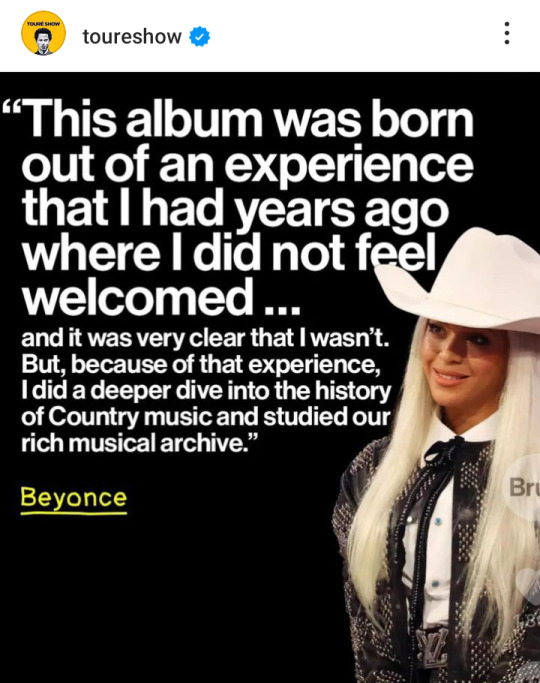

#beyoncé#queen bey#country music#cowboy carter#instagram post#texas hold 'em#16 carriages#hot country songs chart#black woman#genre#irrelevant#inspiration#american flag#horse#number one single#supporters#race#music#unwelcomed#cma awards#daddy lessons#lemonade album#the chicks#dixie chicks#racist backlash#country fans
88 notes
·
View notes
Text
Honestly, one of the reasons I love shitposting about isekai is that it’s one of the starkest illustrations of fundamental inadequacy of the checklist-of-tropes approach to genre construction.
It’s easy enough to say “isekai means portal fantasy, therefore isekai when portal”, yet there are works where the protagonist goes through a portal which are not generally considered to be part of the isekai genre, and contrapositively, works which are generally considered isekai in which no portal is in evidence.
That people going through a portal as a central plot device is neither necessary nor sufficient to establish a work as portal fantasy is like the Platonically perfect example of how fucked up the whole concept of genre is, and I enjoy it very much.
2K notes
·
View notes
Text
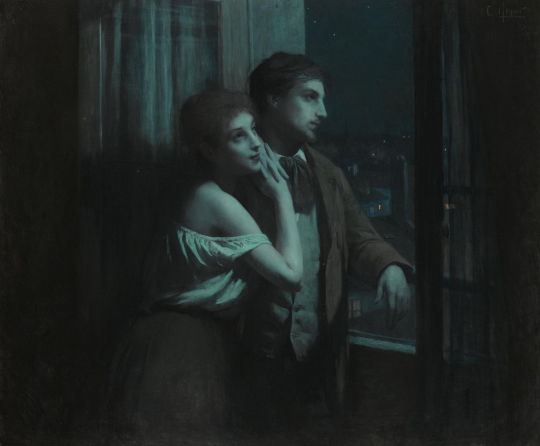
Reverie
Charles Amable Lenoir, 1893
291 notes
·
View notes
Note
I've got a question!
I know based on your blog that Ming Fan is Shen Qingqiu's senior disciple, but does that mean he was the first disciple Shen Qingqiu accepted period, or that he was the first one Shen Qingqiu promoted to inner disciple?
I don't recall any mention of inner vs outer disciples prior to the Airplane extras, so I'm a bit unclear on how that might related to the position of senior disciple.
Sorta related, but do you think there may still have been other young disciples on the peak, that were selected by the previous peak lord, when Shen Qingqiu took over? I'm uncertain if the peak lords would stop selecting new disciples in anticipation of their ascension, or they would continue to select them as usual.
I suppose they could do something like bringing their designated successors along with them to the selections, then making their choices with said successor's input. Or perhaps it's entirely up to the peak lord, with some continuing to make selections on their own, others allowing their successors to advise them, and still others no longer accepting disciples (plus Bai Zhan continuing to do it's own thing, where nobody is selected, but anyone can climb the mountain and join).
At this point, I'm seriously considering making an "Explaining Canon" post about the workings and rankings of CQM as far as we know, including the different types of disciples, acceptance policies, etc. because it can get pretty confusing, and there are a lot of gaps in what canon tells us that can sometimes be filled via genre convention, but other times it's a toss-up/entirely up to interpretation. SVSSS kind of plays fast and loose with worldbuilding in general, and we already know that PIDW does too, so it does sort of make sense but at the same time it can be so confusing for fic writers!
This got long so, answer below the cut:
Ming Fan being Senior Disciple means that he is currently the most senior of Shen Qingqiu's personal disciples/Qing Jing Peak's inner disciples (for CQM, I believe those terms are somewhat interchangeable but I'll explain them more in another post). It doesn't mean he was the very first one Shen Qingqiu took-- though he was probably one of the first. We do know that SQQ has driven disciples off the peak before, so it's possible that Ming Fan had a shixiong or two that are no longer present, but it's also equally likely that he was, in fact, the first inner disciple. As for a promotion, disciples don't have to start as outer disciple and then become inner disciple-- that was SQH's situation, but Luo Binghe seems to be an inner/personal disciple from when he was first selected. My interpretation is that inner disciples are those personally selected by the peak lord, while outer disciples are either those selected by other members of the PL's generation, or those who asked to be taken into the peak and were accepted, but not actually chosen themselves. Different peaks might also have different admission policies-- perhaps An Ding Peak accepts a larger amount of outer disciples due to the manpower required, while Qing Jing Peak's ranks may be thinner. This, of course, is all just speculation-- there are plenty of possible explanations, since canon doesn't give us much to go off of in this sort of thing.
We do know that there are disciples of the PLs' generation on the mountain, with a specific example being Bai Zhan's Ji Jue, but there's nothing to say when the former generation stopped accepting disciples. It is common in xianxia, though, for a master to close their gates and stop accepting disciples altogether-- oftentimes the 关门弟子 character type I discussed here can be an exception to this, taken in after the master has normally stopped accepting disciples. My guess is that, most likely, a peak lord would stop taking young personal disciples before ascension, but there's nothing to say distinctly one way or another. Personally, though, I think it highly likely that Shen Qingqiu was also 关门弟子, and there were no others accepted after him, but that's just my headcanon.
For QJP specifically, we don't see any members aside from SQQ and his direct disciples. This doesn't necessarily mean there are no others, as we know that SQQ was not the only member of the peak when he became PL, but QJP also may be a fairly small peak, and SQQ's shixiong may have decided to leave or go often travelling after he became peak lord-- otherwise, there are other members of the peak and their disciples, we just never meet any of them in SVSSS and they are not mentioned.
I wouldn't be surprised if successors went along to the selection, perhaps even selecting their first disciples before the former generation's ascension-- this would occur once the former generation had officially closed their gates and stopped accepting disciples, passing the lineage on to their successors. It also wouldn't be surprising for successors to simply attend the selection in order to observe it. We do know that Cang Qiong holds a recruitment once every year-- so there is some way for new disciples to get onto the peak, whether it is the successors taking their own, or other members of the current leadership generation, or outer disciples being accepted without a specific master.
Ultimately, I think that CQM's Peak Lords have a lot of freedom in how they run their peaks, including how they select disciples, when they close their gates, etc. CQM really does seem, a lot of times, to be more like twelve individual small sects rolled up into one, instead of one fully cohesive unit with policies and customs uniform across the peaks. At the end of the day, we don't have very much canonical worldbuilding, so a lot of things are up for interpretation when writing fics.
If you want some ideas on how things might be run, feel free to take ideas from other xianxia/wuxia novels-- for example, Tai Sui by priest and Zhu Xian by Xiao Ding both have fairly comprehensive political/sect worldbuilding, where MXTX's worldbuilding is a bit more loose/only made note of when specifically relevant to the plot, which is more closely focused on relationships between characters.
In the end, I would absolutely love to have more canon information regarding Cang Qiong's disciple selection, and sect rules and demographics in general, as well as more about the ascension of peak lords and transfer of power... sadly, it seems we will have to forever make do with headcanons.
#answered#svsss#cang qiong mountain sect#xianxia#genre#even though the main thing of this blog is the titled posts#i am still more than happy to answer these sorts of questions#putting the xianxia hyperfixation to good use is always fun for me!#anyway i hope this answers your questions as much as possible!#sadly there's so much we will never know for sure#but it does make for an interesting collection of fanfics with such open possibility for headcanons!
75 notes
·
View notes
Text
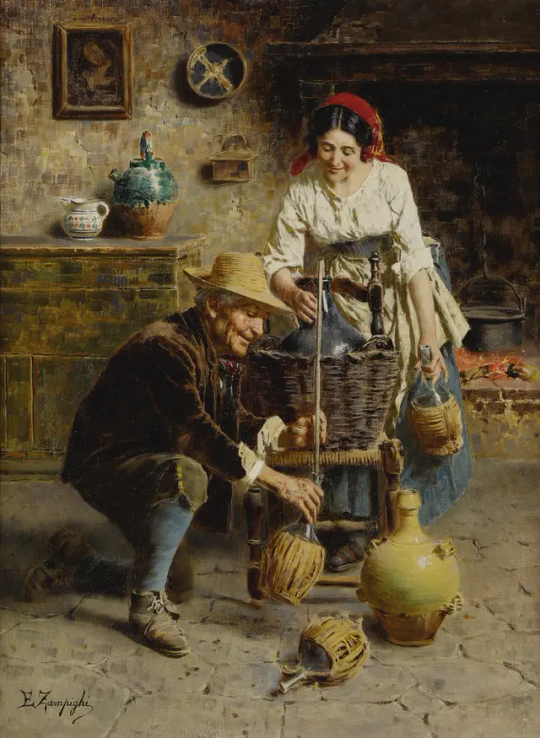
Eugenio Zampighi
(1859 - 1944)
The Wine Makers
Oil on canvas
23.75 x 18.125 inches
Signed
#eugeniozampighi#Italian#italianartist#italianart#wine#winemaker#winelover#art#arte#19thcenturyart#figurativeart#painting#paintingoftheday#genre#theacademictradition#simplertimes#interior#fine art#fineart#work of art#art work#workofart#19th century art#figurative art#genre painting
81 notes
·
View notes
Text
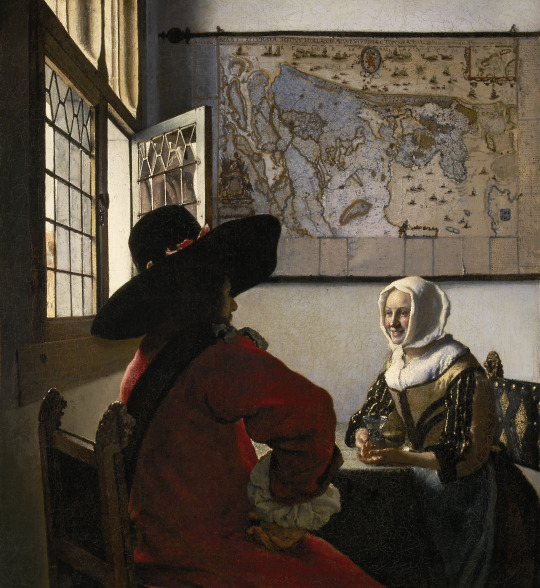
Johannes Vermeer - Officer and Laughing Girl (c. 1657)
#art history#paintings#art#dutch#netherlands#dutch golden age#dutch painting#dutch painter#baroque#genre#genre painting#17th century#1600s
95 notes
·
View notes
Text
Major bit of "hmm, I wonder what this could possibly mean about our way of thinking?": fiction genres "post-apocalyptic" and "dystopian" being treated as roughly the same thing, which is a sub-category of "science fiction"
803 notes
·
View notes

